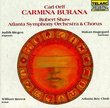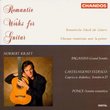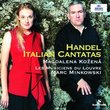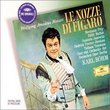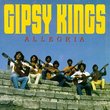| All Artists: Giuseppe Verdi, Claudio Abbado, Katia Ricciarelli, Plácido Domingo, Elena Obraztsova, Leo Nucci, Nicolai Ghiaurov, Lucia Valentini-Terrani Title: Verdi: Aida / Abbado, Teatro alla Scala Members Wishing: 0 Total Copies: 0 Label: Deutsche Grammophon Release Date: 12/8/1983 Album Type: Box set Genre: Classical Style: Opera & Classical Vocal Number of Discs: 3 SwapaCD Credits: 3 UPC: 028941009227 |
Search - Giuseppe Verdi, Claudio Abbado, Katia Ricciarelli :: Verdi: Aida / Abbado, Teatro alla Scala
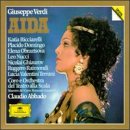 | Giuseppe Verdi, Claudio Abbado, Katia Ricciarelli Verdi: Aida / Abbado, Teatro alla Scala Genre: Classical
|
Larger Image |
CD DetailsSimilar CDs
Similarly Requested CDs
|
CD ReviewsFlawed, but a Jewel Just the Same William T. Clegg | Pocatello, Idaho United States | 06/15/2000 (4 out of 5 stars) "Deutsche Grammophone's 1981 La Scala AIDA was one of the first digital recordings of Verdi's masterpiece. Led by Claudio Abbado, then reigning at Italy's premier opera house, it is a beautifully dramatic reading, proportionately well paced and, for the most part, well sung. At full price, it's hard to recommend it as a first choice, but anyone interested in this opera won't want to be without it.In the men's and comprimario departments there isn't a weak link to be found. Domingo gives his best recorded account of Rhadames, with finer detail than in his previous outings with Leinsdorf and Muti but losing nothing of the power, molten tone and security he'd already displayed in the role. As for Leo Nucci, he isn't the best Amonasro I've heard, but there's nothing in his performance to complain about and much to admire. The Ramfis of Niccolai Ghiaurov has aged well and it's acutally this aging that gives his performance the edge over other recorded High Priests. It's the best version of the role to be found. Ruggero Raimondi's warm voice and commanding presence make a regal king of Egypt and it's a luxury to have him in a role usually reserved for less-distinguished singers. As for the smaller roles, Piero de Palma, always excellent, gives what would be his last recorded Messenger and Lucia Valentini-Terrani contributes an ethereal High Priestess.It's the vocal performances of the two leading ladies that are this jewel's flaw. Katia Ricciarelli possessed a golden voice, good looks,and the ability to project the drama through the text. Her vocal technique on the other hand was less than masterful. One gets the sense that someone saw her potential, wanted to be the one who could claim discovery, and therefore she was put before the public prematurely, a kind of exploitation that became highly visible in the 1970's and 80's as star singers became older or retired with no one to replace them. There are many moments in this particular recording that Ricciarelli is reminiscent of Montserrat Caballe, though she is minus Caballe's vocal freedom. Ricciarelli almost cruelly pushes her voice and many high notes come out as desperate, pressured squalls, especially when a fortissimo is required. On the positive side, in the middle and lower registers, Ricciarelli's singing is tender and delicate, creating a believably vulnerable Aida, and her way of putting just the right emphasis on key words makes one ache for what might have been had this artist been allowed to develop in her own time.For her part, mezzo-soprano Elena Obraztsova's Amneris has no problems cutting through the orchestra with her powerful, vinegary tone, although her method of vocal production gives her a disagreeably wide vibrato that at times obscures the pitch. There's nothing to carp about in her overtly dramatic performance, though I personally prefer the likes of Verrett, Simionato, and Cossotto. In the end, all of this is really a matter of taste, so there are most likely those who would have no objections to Obraztsova's performance.Finally, the sound quality is everything you'd expect from a digital recording, clear and accurate, if somewhat sterile and occasionally congested. The aural staging is effective, and the orchestra and chorus perform well under Abbado's able, inspired direction. In short, this really would have been an unbeatable performance had Ricciarelli and Obraztsova been stronger. As it is, there is much to enjoy here, and for those already acquainted with AIDA and looking for a fresh take on the opera, this is a good recording to acquire, though it would be even more irresistable at a lower price." This includes the famous brass -and more Santa Fe Listener | 07/11/2002 (5 out of 5 stars) "OK, I confess... I am an great admirer of Abbado and that is because he do mostly everything very professional but not "dull".You have always "new" interprets and more "steady" ones. This is a "staedy" one and thats not easy do that (sometimes I wonder if "new", radical versions depends on that the conductor cant read notes?:-)Anyway... I own the famous version from Muti (EMI) too and I like this one even better. Singing here is at nearly same level... (Caballe is good at Mutis version but so is Ricciarelli here)and at least is Domingo very good here again BUT music is def. better on this version in my opinion.And something about music that IS importent in Aida are of course the brass in the triumph-march. Brass at Mutis version sounds like a scared kitten compared to this even if it is well played too otherwise but you miss essential Aida/Verdi without the famous brass sound.This is an old, so called "to crystal claer CD" (it is not remastred), but sound is VERY good but I suggest DG remaster it anyway and put it on two discs instead on three and fix price but it is DEF: worth its full price if they dont so buy it if it goes out of print.Enjoy." A major disappointment from Abbado Santa Fe Listener | Santa Fe, NM USA | 02/08/2007 (3 out of 5 stars) "Claudio Abbado, who I believe was head of La Scala when this Aida was made, is capable of exciting Verdi readings, but this isn't one. I don't know if he was trying to make the score sound less like a warhorse by smoothing it out and reducing the melodrama, but Aida isn't a warhorse: it's a masterpiece. His staid tempos and underpowered climaxes frustrated me from beginning to end.
Not that there is any huge losss when it comes to the singing. Domingo was arguably more powerful in hhis two other studio recordings opposite Leontyne Price for RCA and Monserratt Caballe for EMI. Here he seems to have been subdued by Abbado's understated interpreatation. As Aida, Katia Ricciarelli is severely over-parted. She was a fill-in during a time when no credible dramatic sopranos were at ahdn, and therefore she landed roles like Tosca, Turandot, and this Aida that even close placement of the microphone can't boost enough. Her tone wobbles severely in climaxes, although I must admit that she tries to inject some dramatic fervor into her phrasing. By contrast, Obrazova chews up the scenery as Amneris and has a clotted Slavic vocal tone that doesn't suit Verdi. The orhcestra nad chorus sound less than enthusiastic. In sum, a big disappointment and one of the least convincing Aidas ever to emerge from a major label." |

 Track Listings (11) - Disc #1
Track Listings (11) - Disc #1


